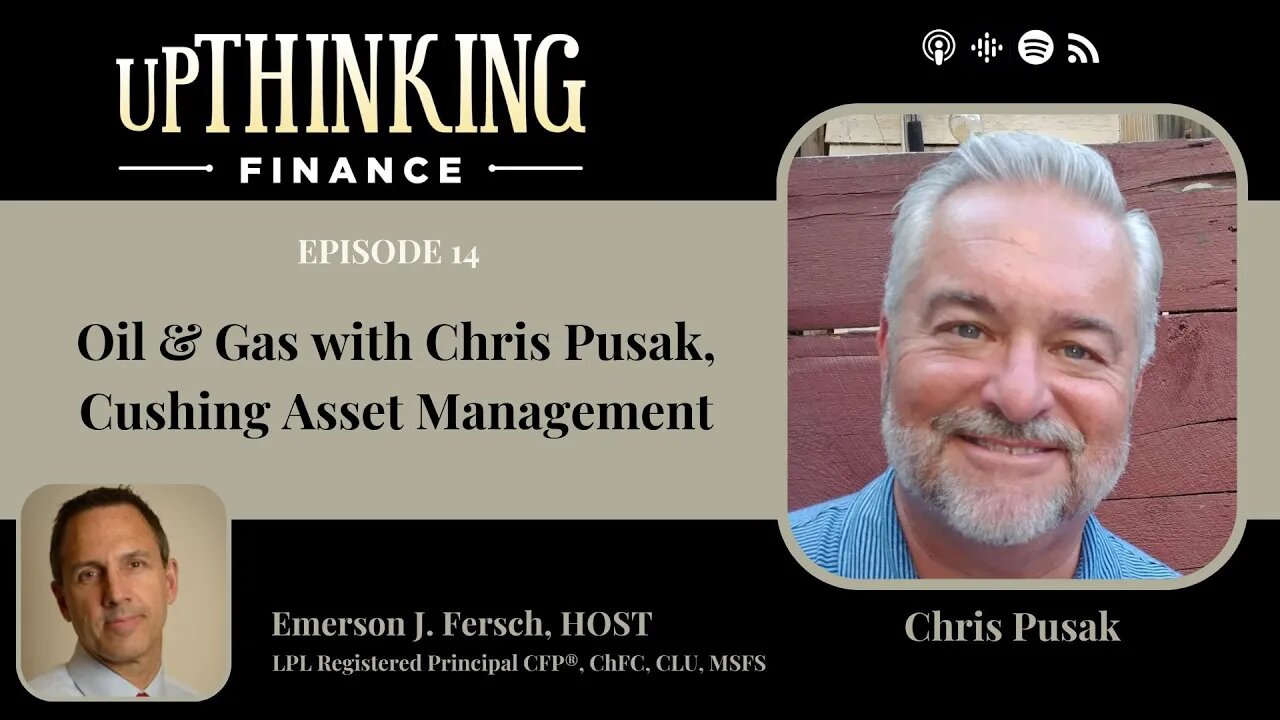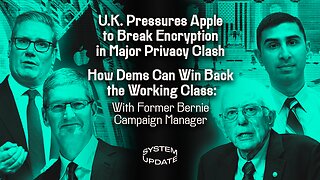Premium Only Content

Oil & Gas with Chris Pusak, Cushing Asset Management, Ep #14
Oil is a global commodity. When President Nixon took the United States off the Gold Standard, it created difficulty with global commodities. At that time, the major oil producers around the world agreed that oil would be priced in dollars globally (which led to the term “Petro-dollar”). When you link something to a currency, it can be inflationary or deflationary.
We prefer the dollar to be strong, which makes the stuff we buy more affordable. Right now, the dollar is strong, but we aren’t seeing deflation. We are in an environment that isn’t following the “rules” of economic textbooks. So in this episode of Upthinking Finance™, Chris Pusak—a Client Portfolio Manager at Cushing Asset Management—helps dissect the energy sector.
We talk about both the local and global impact of oil production and distribution, why fracking won’t end, and weigh in on the various political and economic factors. Don’t miss this episode!
================================
LISTEN IF YOU ARE INTERESTED IN…
[4:39] Learn more about Cushing Asset Management
[7:31] Why the energy sector plays a huge role in the economy
[11:11] Dissecting the influence and impact of OPEC
[13:16] The two common types of drilling for oil
[17:46] How the green movement will impact the future of energy
[25:36] Why the price of natural gas is immensely volatile
[27:32] The political impact on the rising price of gas
[32:13] Where is the energy industry headed?
The two common types of drilling for oil
At some point, Chris points out that the world will start to run out of oil. We may completely deplete oil from the planet. The Saudis do conventional drilling and draw from a pool from an underground oil reserve (it’s like sucking the oil out with a straw). The US mainly engages in hydraulic fracturing.
Oil drilling was a risky business before this technique was developed. With hydraulic fracturing, you put the drill bit down two miles (10,000 feet) and then turn it sideways and drill out two miles. This allows you to “sweep” the area so you never miss.
With hydraulic fracturing, you get the most production from a fractured well in the first 2–3 years, and then production declines quickly. Because of the way these wells work, you consistently have to drill new wells to keep production levels steady. It’s expensive and requires a lot of capital upfront. Oil companies are motivated to drill to maximize profits and that’s the simple reality.
How the green movement will impact the future of energy
There is a transition taking place. However, the problem is that the green movement is trying to flip the switch too quickly. Many countries can’t meet the demand for green energy. Chris points out that only 3% of power today is generated from non-carbon fossil fuel sources.
Because of this, banning fracking is impractical. Globally, oil is mainly a transportation fuel. Chris believes that there will be a day when oil is unimportant to the world. But Chris isn’t sure that will happen during our lifetimes.
The case for fracking: natural gas
Natural gas has greater longevity. Why? Because when you drill for natural gas, you get a dry gas (methane), which is converted to electricity. The US has reduced its carbon footprint by reducing power generation from coal to methane. Methane now contributes to 40% of power generation in the US.
Wet gasses that are drilled include butane, propane, and methane. Butane is common in lighters. Propane is used as a source for heating and cooking. Methane gas is one of the main ingredients in plastics.
Chris emphasizes that “If you ban fracking…you would send the price of all energy into the hypersphere, creating massive inflation and a global depression—as if we were living in 1875.”
Recently, because of the pandemic and energy policies in Europe, the price of natural gas has skyrocketed from $2 to $60–$70 in Europe. It’s $9 for 1 million BTUs in the US.
Where is the oil industry headed? What is the influence of OPEC and the IEA on the energy industry? Listen to the whole episode to learn more about what impacts the pricing of oil & gas and how it impacts you.
Chris Pusak is not affiliated with or endorsed by LPL Financial or Capital Investment Advisers.
The opinions expressed in this material do not necessarily reflect the views of LPL Financial.
Securities and Advisory services offered through LPL Financial. A registered investment advisor. Member FINRA & SIPC.
The financial professionals associated with LPL Financial may discuss and/or transact business only with residents of the states in which they are properly registered o
=================================
CONNECT WITH CHRIS PUSAK
Connect on LinkedIn: https://www.linkedin.com/in/christopherjpusakcima/
=============================
CONNECT WITH EMERSON:
Website: www.CIAdvisers.com
-
 LIVE
LIVE
TimcastIRL
2 hours agoDemocrats SHUT DOWN Congress Blocking Censure Of Al Green, OBSTRUCT House w/Joe Redden | Timcast IRL
11,007 watching -
 1:03:27
1:03:27
Glenn Greenwald
6 hours agoUK Pressures Apple to Break Encryption in Major Privacy Clash; How Dems Can Win Back the Working Class: With Former Bernie Sanders Campaign Manager Faiz Shakir | SYSTEM UPDATE #419
37.8K44 -
 47:39
47:39
Michael Franzese
4 hours agoJewelry King Trax NYC EXPOSES How the Powerful Steal from You
45.3K12 -
 LIVE
LIVE
Slightly Offensive
4 hours ago $1.04 earnedCandace REDPILLS the Masses in BOMBSHELL Theo Von Interview | Guest: Shane Cashman
1,405 watching -
 UPCOMING
UPCOMING
DLDAfterDark
38 minutes agoDLD Live! That Sh... Will Get You K***ed! What To Consider in SHTF
-
 LIVE
LIVE
megimu32
4 hours agoON THE SUBJECT: IRL Streamers Attacked & Nostalgic Animal Movies That Made Us Cry
459 watching -
 1:00:54
1:00:54
The Tom Renz Show
7 hours agoMore Epstein/FBI, a Scary Trade War, & the Dem Echo Chamber
7.49K1 -
 40:43
40:43
Kimberly Guilfoyle
8 hours agoDems Double Down on Delusion-Why? Live with Tony Kinnett & Bo French | Ep.202
77.8K35 -
 1:28:42
1:28:42
Redacted News
6 hours agoBREAKING! SOMETHING BIG IS HAPPENING IN EUROPE ALL OUT WAR IS COMING AGAINST RUSSIA, TRUMP FURIOUS
121K291 -
 47:50
47:50
Candace Show Podcast
7 hours agoBREAKING: Judge Makes Statement Regarding Taylor Swift's Text Messages. | Candace Ep 155
113K120